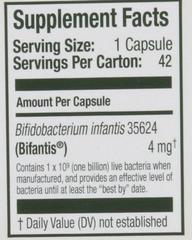Welcome to Part 1 in a series of articles that will teach you all about probiotics. We quite often say that in the unregulated supplement industry, it’s the probiotics that show how bad it really is. Not only do we have the same manufacturing concerns as with other natural products, but we have to try to also keep bacteria alive!
We believe that before you buy a probiotic, you should speak to one of our experts. Choosing the right probiotic is more complicated than just picking up a product and trying it out. There are LOTS of factors, and here we discuss just 2 of them.
In this article, we’re going to focus on two major misconceptions people have with probiotics. Coincidentally, these two points are the two most common things people know about probiotics.
When people shop for a probiotic, they usually are looking for 2 basic things – “Billions of bacteria” and that they are refrigerated. While these are great places to start, there are a LOT more things that one should know about buying probiotics.
Billions aren’t necessarily good.
People know that probiotics aren’t normally measured by weight. If a volleyball team stood on a scale big enough, it would read something like 1200 lbs (men’s volleyball, in this instance). We could weigh probiotics like this, and it would be expressed as milligrams or grams. But, like in volleyball, it’s more important about how many players there are on the court. In volleyball, we’d want 6. In probiotics, we typically are shooting for billions. Most people know that part.
Bigger isn’t really better though. Don’t get us wrong – good probiotics will have a good dose of active colony forming units (called CFUs). If we are measuring probiotics by the number of players on the field, then we need to make sure that we only count the probiotics that are actually doing something. It doesn’t help our volleyball team if 2 players have only one arm or no legs.
All probiotics should be rated in terms of CFU, not by weight (like milligrams or mg). The reason CFU’s are preferred is because we need a good way to tell how many active bacteria are in a batch. In any given amount of probiotics, some of them will be dead, some will be duds (meaning they can’t reproduce in your gut to actually help you), and hopefully lots of them will be studs. The CFU helps us identify how many studs are in any given amount of probiotic powder.
So the more studs, the merrier right? Not necessarily so.
Think about taking probiotics like a game of war. In all reality, that is what you are doing when you are taking probiotics. The “cavalry” you are introducing are there to reinforce the front (your gut) and eliminate any of the rebel forces (the bad bacteria).
If we had an option between 100 billion archers and 10,000 tanks, what would you choose? This is why the logic of “bigger is better” doesn’t work for probiotics. We want efficiency – the right dose of the right strains to be effective, not just lots of unknown strains. In future articles on probiotics, we’ll discuss the impact of strain selection.
Potency Through Expiration
We now know that it’s not just about having “billions” of bacteria, but about having billions of active, reproducing bacteria (of the right strains!). But the labels of probiotic products still lie to us. Let’s look closely at this label:

Without getting into the nitty-gritty (how the strains are different, serving size, etc) – focus just on the CFU. There is something very interesting on this label that was actually added after lots of backlash from consumer groups.
The label states very clearly that there are BILLIONS of bacteria at the time of manufacture but not through expiration. This means, that when they mix the formula up – and who knows how long ago that was – they used billions. You’re only guaranteed to get 10 million though. And it’s way worse than that; typically you’ll see about 1/4 the labeled dose in third-party analysis that simulates more real-life conditions.
Any probiotic you buy should have the labeled dosage guaranteed through expiration date. All “Vitality Approved” probiotics we sell are good doses of the right strains and guaranteed through expiration.
Probiotic Buying Guide Rule 1: Buy the right amount (measured in CFUs) of the right strains that are guaranteed through expiration.
The Refrigeration Slight of Hand
One thing we hear commonly is that people know that probiotics should be refrigerated. They are right, partially. The crucial thing to remember is that not just that probiotics need to be refrigerated, but the cold chain MUST be maintained throughout the product’s lifecycle. That little tweak to the wording is where many retailers and probiotic companies deceive their customers about the products they sell.
The ideal scenario is that probiotics are cultured, manufactured, shipped, sold, and stored with temperature controlled. This is the “cold chain.”
For most retailers, the first time probiotics are refrigerated is when they are received in store. Many retailers get probiotics from distributors instead of direct from the company. This is actually a big difference, because great manufacturers are serious about the cold chain.
But many distributors (at the regional or national level) do not take such precautions. The cold chain is almost never maintained and we have LOTS of evidence of that – from first-hand experience, stories we’ve heard, and confirmation from distributors and manufacturers.
Get ready for this: this even goes for “Vitality Approved” brands of probiotics. No, not literally our products. Our probiotics are guaranteed to ensure the cold chain. BUT – just because you may see Natren (our favorite probiotic company) in another store, it doesn’t mean that store ensures the cold chain is always maintained.
Some companies don’t even try. Leading, expensive brands such as Culturelle or Align are found on the shelf in an effort to get them into more consumers hands. Most stores aren’t equipped with refrigeration for just supplements.
Here’s the take-home message: There is NO WAY a consumer would know if the cold chain was maintained, unless you asked and the person who answered actually knew and was being honest with you.
It is expensive to keep a product cold through the whole process. It should be noted that the temperature does not have to be TIGHTLY regulated; probiotic brands have validated their shipping and have shown that as long as proper controls are in place, “excursions” – or short times outside of ideal range – are permitted.
Part of our controls includes temperature monitoring of refrigerators. We also won’t ship probiotics on a Friday (and sometimes Thursday – depending on how far away people are) as we don’t want them sitting around in a distribution center over the weekend.
Probiotic Buying Guide Rule 2: Only buy probiotics where you can guarantee the cold chain has been maintained.
Our Top Probiotic Recommendation
For general health, you’ll want a mix of acidophilus and Bifidus bacteria, as acidophilus is found primarily in the small intestine and Bifidus in the large intestine. Selecting the proper strains requires a pseudo-degree in probiotic manufacturing, so we’ve done the work for you.
Probiotic Complete was created to simplify the process. It has a powerful dose of 4 of the most studied strains in humans.
These strains are NOT competitive, so they’re into the peace and love scene like us in Woodstock.
They’re also temperature stable, and we have data to prove it! They’ll last a year at 80 degrees- you don’t even need to turn on the air conditioning in your house.
This is what makes Probiotic Complete our top pick for general GI health, or for anyone prescribed an antibiotic.
Just trying to keep it real…

Neal Smoller, PharmD
Owner, Pharmacist, Big Mouth



